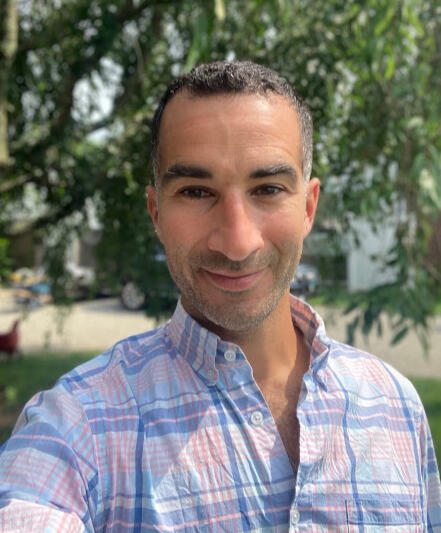THE BIG PICTURE
STUDENT VOICE
In my research, I had released a survey to and recorded the first 50 responses of people from my high school. Here are a few of the most interesting statistics;54% of people observe homophobic behavior once a week or more70% of people observe body-shaming once a week or more54% of people observe racism once a week or moreI asked all participants to choose a number on a scale of 1-7 in relevance to this question;
How inclusive do you think we are as a society? (with 1 being the least inclusive and 7 being the most inclusive)The most frequent response was a 4, with 48% of responses.During my interviews with both James Freund and Michael Catanese, they were both asked that question as well. They both gave me answers indicating more inclusivity within our society.

They both had similar viewpoints in that the people they surround themselves with are inclusive of people, and they do not experience or see much hate in their day-to-day life.They also both said that many people are likely to hide their controversial opinions in different environments, such as school or work. Therefore, we are less likely to actually witness these behaviors in real life.I gave students space to speak on any thing regarding the questions I had asked, which pertained to the topics discussed throughout this website and our openness towards people in these groups. One student said this:"I think the reason these subjects are so popular is because they get publicized a lot. I think it is a good thing that there is light being brought to these subjects because they need to end. However I think people believe it is a lot more prevalent than it actually is because it is publicized so much. I believe the vast majority of people are against these behaviors we just have a fraction of the people that unnecessarily hold these opinions and hold these disgusting beliefs. I believe the vast majority of Americans are respectful and inclusive."
TALKING WITH JAMES FREUND
James Freund, known to me as Mr. Freund, is the principal of Seymour High School, where he has worked as an administrator for years. Growing up in Brooklyn, I wanted to speak to him to see what changes he has seen in terms of inclusivity as he has matured, especially since he now works in an educational environment.

Me: I guess my first question would be: How have you noticed changes in attitude towards marginalized groups... over the last few years?Freund: Well, for me I'd have to actually go back, you know, if I went back to my own personal childhood, growing up in Brooklyn, New York. I attended a school which was multicultural, multi-ethnic... I've always been exposed to a diverse group of kids and growing up in the 70's, it was a tumultuous time, relevant to race and ethnic conflict, so to speak.
Over time, I think it's something a lot of people turn their head to and they don't pay attention to it. To be honest, there were times where I really wasn't paying attention to it because I'm just living my life.
I do think, though, that right now it's tense, there's tension.
I think it's become more pronounced so there could be a number of reasons, I don't know why.Freund: But is that, honestly, because of what the news feed has been sending us, or is it actually a true change in how humans perceive things?
like I don't trust news sources, right? I think most of the news sources out there have an intended purpose of swaying people's opinions. I think right now we're being fed a lot of "news" to sway our opinions one way or the other. And it's a dangerous thing that's going out there. I think that what we perceive to be a situation that is getting worse, could in fact be artificially created by a news source. So we perceive it being worse, and then people start feeding off of it, right? So whether it be relevant to race, ethnicity, preference, sexual preference, or gender identity or anything like that, when it's, When the news, our outside media sources, are presenting a situation to us that it's bad, we then think it's bad. I think everybody [or most people are] is a good person and on their own they wouldn't necessarily draw that conclusion.Me: That would lead me to my next question, since you are an administrator and we've just established that you have seen this type of behavior-Freund: Oh yeah, it seems like it's gotten more severe, I mean, when I was a kid... I called a number of things... I wasn't necessarily treated nice because of my race. So, you know, and that's like, I never understood why. I was just a person.Me: Right, you're just living your life.Freund: I'm just living my life.Me: So I was wondering if you could tell me about a time that you confronted discriminatory behavior and how that impacted your outlook.Freund: Well, I don't like the word 'confrontation'. I like to see myself as an educator, I'm a teacher at heart, I still am a teacher. Whenever we're working with young people that have these ideas, we try to educate them, right? So I think the strongest tool that anyone can have is an education. One that's not influenced by outside sources such as news. When we deal with this, in particular with students, it's about educating them, trying to have them be more reflective and consider how would it feel if the situation were reversed and you were subject to this type of criticism or ridicule. That is, we try to get them to think of it that way.Me: Yeah, I always feel like people, at my age, feel the need to speak their mind on things that aren't necessarily their place to speak on.Freund: Or haven't been part of their life experience. They've been manipulated by the media.Me: And all of that doesn't necessarily lend itself to be an inclusive environment for your education or any of those things.Freund: Exactly. I think what my grandparents used to say is this phrase, to each their own. And, and that's, that's all that predates, you know, that goes back to the early 1900's and, and, you know, what that means is each, to each their own. It means that each person is their own, right?... I think that everybody has a right to live the life they'd like to live. Who am I to implement or enforce my ideals on them? I'm just another person.Me: So what steps have you taken to create that type of inclusive environment in our school's community?Freund: Well, I think that it's important for marginalized groups, to feel included, right? I know that several years ago, we had purchased several little rainbow stickers, and I suggested to the teachers, if they wanted to put them on their door, to do so, because it makes people more comfortable, right?
And most of the teachers actually took advantage of those stickers. And I know through my own personal life experiences where a simple thing like that does wonders for somebody who might feel like they're isolated from the rest of the population. They know that, hey, there's a safe place to go. There's somebody I could talk to if I need to. It's just a simple sign.Me: Exactly. So this is my last question. And I'm just going to ask you to put on a scale of one to seven, one being the least inclusive and seven being the most inclusive. How inclusive do you think we are as a society, or how good do you think we are at making people feel valued and respected?Freund: In my own personal realm, you know, in my life experiences, and again, excluding what I see on TV, a completely set of personal experiences, I don't see a lot of hate in my life, in my realm. I would have to say a five, as a part of [my realm] is the school, and although I suspect [there's discrimination] there, it doesn't present itself to me. Because they probably know if it did, I would do something about it. But the reality of it is I have the feeling that we're a pretty inclusive environment here in Seymour High School, although I know the reality of it is there's some aspects that aren't, right? I think if young people, students, harbor feelings of negativity towards other people, they keep it pretty much under wraps, at least from the adults.
THE IMPORTANCE OF INCLUSION
Through the process of creating and researching this project, I truly realized that the 'illusion' I had been looking to find is truly only found when you look at your phone, open any social media platform and look at what is trending. Chances are it's probably sparked controversy and has many people quick to be 'thumb warriors' and radically defend whatever stance they took on whatever issue.Companies and corporations latch onto this idea that any publicity is good publicity, and will either purposefully exclude one group, in the case of lacking appropriate sizing or shade range. Or, they will release a more inclusive range after the initial release.When we are involved in face-to-face interaction, we are less likely to defend controversial opinions (or at least to the same extent). This is due to the fact that we want people to like us, and in more professional environments, it is easier to make that happen through pretending to be neutral on all fronts.Despite my findings confirming that a lot of this controversy is media-created, it doesn't change the lack of respect many people experience because of their race, size, gender or sexuality in their day-to-day, since it is clearly and will forever be there. And it certainly doesn't negate the fact that many state governments are trying to cut off the freedom of queer people, whether that be medical, social or work freedom. The way I see it is this;(marginalized group of choice here) rights are human rights!black rights are human rights
gay rights are human rights
trans rights are human rightsEverybody should always be treated with the utmost respect. The only reason this should change is if they treat you or others in a way that does not warrant your respect. But for you to figure this out, you would need to actually speak to them long enough to see past their race, size or any other superficial factor.